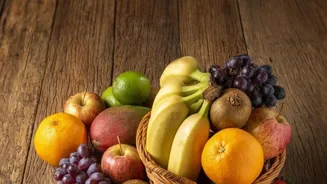Unlock the secrets of a balanced diet for a healthier, happier you! Dive into the key components and why they're vital. Read on!
Namaste, readers! In today's fast-paced life, we often forget the most important
thing: our health. And a crucial part of staying healthy is eating right!
A balanced diet isn't just some fancy term doctors throw around; it's the real deal for feeling energetic, staying fit, and keeping those pesky diseases away. Think of your body like your favourite vehicle; you need to fuel it with the right stuff to keep it running smoothly, right?
That "stuff" is a balanced diet. So, let's dive into what makes up this magic mix and why it’s so important for us Indians!
Balanced diet provides essential nutrients for optimal health
A balanced diet is all about getting the right amount of nutrients your body needs to function properly. It's like a perfectly orchestrated symphony; each instrument (or nutrient) plays its part to create beautiful music (or a healthy you!).
It's not about starving yourself or cutting out entire food groups. It’s about eating a variety of foods in the correct proportions. This ensures you get all the vitamins, minerals, carbohydrates, proteins, and fats your body requires.
Skipping meals or relying on just one type of food can lead to deficiencies and make you feel sluggish and unwell. Think of it as building a house; you can't just use bricks, you need cement, wood, and other materials for a strong and stable structure.
Similarly, your body needs a variety of nutrients for optimal health.
Understanding key components of a balanced diet
A good place to start is understanding the seven key components of a balanced diet. These are the building blocks that will pave your way to a healthier and happier you. Trust me, incorporating these into your daily life isn't as difficult as it sounds. We’ll break it down step by step.
First up, we have carbohydrates. Carbs are your body's main source of energy. They fuel your muscles, brain, and nervous system. However, it's essential to choose the right kind of carbs.
Opt for complex carbohydrates like whole grains (wheat, millets, brown rice), fruits, and vegetables which release energy slowly and steadily, preventing those energy crashes. Avoid simple carbs like sugary drinks and processed foods, as they provide a quick burst of energy followed by a slump.
Consider including roti made from whole wheat, a portion of brown rice with dal, and plenty of colourful veggies in your meals. Next up, proteins.
Proteins essential for body tissues; include in every meal. Healthy fats crucial for health; choose wisely
Proteins are the building blocks for your body tissues. They are essential for growth, repair, and maintaining muscle mass. Good sources of protein include dals (lentils), beans, chickpeas, paneer (Indian cheese), and nuts. Make sure to include at least one protein source in every meal.
For example, you could have a bowl of chana masala (chickpea curry) with roti, a paneer tikka snack, or a sprout salad. Fats are often demonized, but they play a vital role in our health. They provide energy, support cell growth, and help your body absorb certain vitamins.
However, like carbs, not all fats are created equal. Healthy fats include those found in nuts, seeds, avocados, and olive oil. Limit your intake of saturated and trans fats, which are found in processed foods and fried snacks.
A handful of almonds or walnuts, a sprinkle of flaxseeds on your morning cereal, or a salad dressing made with olive oil are great ways to incorporate healthy fats into your diet.
Vitamins, minerals, and fiber in fruits and veggies support overall health
Vitamins and minerals are essential for a wide range of bodily functions, from boosting your immune system to maintaining strong bones. A balanced diet rich in fruits and vegetables is the best way to get your daily dose of these vital nutrients.
Different coloured fruits and veggies contain different vitamins and minerals, so aim for a rainbow on your plate.
For example, carrots are rich in vitamin A which is good for your eyes, spinach is packed with iron which helps prevent anemia, and oranges are a great source of vitamin C that strengthens your immune system. Include a variety of seasonal fruits and vegetables in your diet every day.
Also, fibre plays a major role in digestion and satiety. It helps regulate blood sugar levels, prevents constipation, and may even lower your risk of heart disease.
High fiber foods vital, water crucial, moderation essential
Whole grains, fruits, vegetables, and legumes (beans, lentils) are all excellent sources of fiber. Increasing fiber intake is as simple as swapping white bread for whole wheat bread, adding a handful of berries to your breakfast cereal, or incorporating more vegetables into your curries.
Water is often overlooked, but it's absolutely crucial for overall health. Water helps transport nutrients, regulate body temperature, and flush out toxins. Aim to drink at least 8 glasses of water per day, especially in the hot Indian climate.
You can also get fluids from other sources such as coconut water, lassi (yogurt drink), and herbal teas. Besides the above components, moderation is key.
Portion control key for balanced diet, watch cues and plate sizes
Portion control is an important part of a balanced diet. Eating too much of even healthy foods can lead to weight gain and other health problems. Pay attention to your body's hunger and fullness cues. Don't overeat just because the food is delicious.
Try using smaller plates to help control your portion sizes, and avoid eating in front of the TV or computer, as this can lead to mindless overeating. Listen to your body. Finally, remember that a balanced diet is not a one-size-fits-all approach.
Your individual needs may vary depending on your age, activity level, and overall health. It's always a good idea to consult with a doctor or a registered dietitian to create a personalized meal plan that meets your specific needs.
They can help you identify any nutrient deficiencies and provide guidance on making healthy food choices.
Adopt balanced diet, focus on progress for long-term health. Start small changes today
Adopting a balanced diet is a journey, not a destination. Don’t get discouraged if you slip up now and then. The important thing is to keep making progress and to focus on long-term healthy habits. Small changes can make a big difference over time. So, start today!
Add an extra serving of vegetables to your lunch, swap that sugary drink for water, or go for a short walk after dinner. Your body will thank you for it, and you'll be surprised at how much better you feel! Stay healthy, stay happy, and eat right! Remember, good health is the real wealth! Jai Hind!
AI Generated Content. Glance/InMobi shall have no liability for the content












